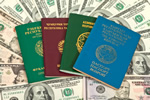Netherlands buy to let mortgages make apartments a good expat investment

Netherlands buy to let mortgages make apartments a good expat investment
The continuing popularity of the Netherlands as a tourism and expat destination as well as its position as a haven for British companies fleeing Brexit means property investment is a good deal at the present moment. For expats wanting to enter the buy-to-let market, mortgages are now easier to get as requirements have recently eased. At the present time, property values are on the up, giving landlords the possibility of capital appreciation as well as rental incomes.
Requirements for a buy-to-let mortgage start with proof of long-term residence on a non-temporary basis, and there’s no minimum gross income requirement. Mortgages of up to 80 per cent loan-to-value are available, with a maximum of 60 per cent as interest only. The mortgaged property must only be used to provide long-term rental, excluding short term rentals as advertised online by Airbnb and similar websites. Mortgages from banks in the Netherlands are subject to the banks’ larger-city policies, meaning that finance can only be granted for properties within the country’s larger cities.
Mortgages can be interest-only, covering 60 per cent of the total amount borrowed, and are normally issued with a maximum repayment timeline of 30 years. If more than 60 per cent of the property’s value is needed, the shortfall can be made up by a linear mortgage repayable within 10 years or earlier. Rental income must exceed the total of interest and repayment due by a ratio of 1.25. If the investor is receiving rental income from another property, the ratio drops to 1.5. Your chosen bank will lso require a valuation of the apartment in a rentable state.
For tax purposes, expat buy-to-let landlords’ properties are represented and taxed as capital, but their rental income is not taxed, In the present financial year, the capital is added on to the total value of your possessions, related to asset values and expected returns and entered in Box 3 of the Dutch tax return form. For example, asset values of between €75,000 and €975,000 with an expected return of 4.52 per cent are subject to tax at 1.36 per cent, and those over €975,000 with an expected return of 5.38 per cent are taxed at 1.61 per cent.
Related Stories:
- Is Kuwaitization the unintended result of the oil price crash? - July 20, 2020
- Expats in Malaysia still banned from overseas travel - July 17, 2020
- HSBC Asia to cut back on internal expat relocations - July 16, 2020
- Tips on integrating for newly-arrived expats - July 15, 2020
Latest News:
- Tips on a trouble-free relocation as an expat overseas - July 20, 2020
- Expats find peace in the covid-19 refuge of Dahab town - July 20, 2020
- Is Kuwaitization the unintended result of the oil price crash? - July 20, 2020
- Expats unhappy abut changes to Korean points-based visa system - July 17, 2020
- Chiang Mai and Bangkok no longer bargain locations for expats - July 17, 2020
- Expats in Malaysia still banned from overseas travel - July 17, 2020
- Vietnam welcomes expats to its safe, affordable lifestyle - July 16, 2020
- Asian tiger economies reach out to expats in Hong Kong - July 16, 2020
- HSBC Asia to cut back on internal expat relocations - July 16, 2020
- Tips on integrating for newly-arrived expats - July 15, 2020


